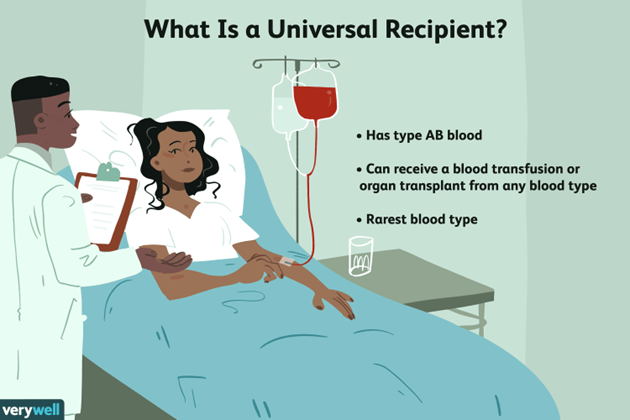A hormone is a secreted molecule that is carried in the bloodstream to where it acts on target cells that bear specific receptors for that hormone.
False
True
The Correct Answer is B
A hormone is a secreted molecule that is carried in the bloodstream to where it acts on target cells that bear specific receptors for that hormone.
This definition is consistent with the dictionary and encyclopedia sources.
Choice A is wrong because it contradicts the definition of a hormone.
Hormones are not just any secreted molecules, but ones that have specific effects on cells with matching receptors.
Nursing Test Bank
Naxlex Comprehensive Predictor Exams
Related Questions
Correct Answer is B
Explanation
Persons with type AB blood are sometimes called universal recipients, not donors. This means they can safely receive a blood transfusion using any other blood type. Choice A is wrong because it confuses type AB blood with type O negative blood.
Type O negative blood is considered the universal donor type because it has no antigens on the surface of red blood cells and can be given to people of any blood type.
Type AB-positive blood is also considered the universal plasma donor type because it has both A and B antigens and can be given to patients with any blood type.
Plasma is the liquid part of blood that carries cells and proteins throughout the body.
The presence or absence of antigens and the Rh factor determine how a person’s immune system reacts to a blood transfusion or organ transplant.
Antigens are substances that can trigger an immune response if they are foreign to the body.
The Rh factor is a protein that can be either present (+) or absent (-) on the surface of red blood cells.

Correct Answer is A
Explanation
This is because ventricular systole is the phase of the cardiac cycle when the ventricles contract and pump blood into the arteries.
The blood pressure in the arteries is greatest during this phase because of the forceful ejection of blood.
Choice B.
Atrial diastole is wrong because atrial diastole is the phase of the cardiac cycle when the atria relax and fill with blood from the veins.
The blood pressure in the arteries is lowest during this phase because the ventricles are also relaxed and not pumping blood.
Choice C.
Ventricular diastole is wrong because ventricular diastole is the phase of the cardiac cycle when the ventricles relax and fill with blood from the atria.
The blood pressure in the arteries is low during this phase because the ventricles are not pumping blood.
Choice D.
Atrial systole is wrong because atrial systole is the phase of the cardiac cycle when the atria contract and push blood into the ventricles.
The blood pressure in the arteries is not affected by this phase because the ventricles are still relaxed and not pumping blood.
The normal range for systolic blood pressure is less than 120 mm Hg and for diastolic blood pressure is less than 80 mm Hg.
Whether you are a student looking to ace your exams or a practicing nurse seeking to enhance your expertise , our nursing education contents will empower you with the confidence and competence to make a difference in the lives of patients and become a respected leader in the healthcare field.
Visit Naxlex, invest in your future and unlock endless possibilities with our unparalleled nursing education contents today
Report Wrong Answer on the Current Question
Do you disagree with the answer? If yes, what is your expected answer? Explain.
Kindly be descriptive with the issue you are facing.
